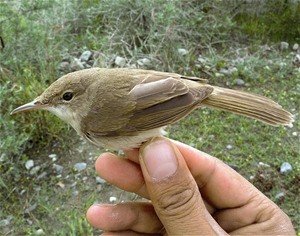
The large-billed reed warbler is just one example of the many rare or unusual species that make the beautiful Wakhan Corridor even more attractive to adventure tourists and ecotourists. USAID is working with local communities to maximize tourism benefits
Wildlife Conservation Society
USAID helps to locate the breeding grounds of the large-billed reed warbler in northeastern Afghanistan.
4 MAY 2010 | WAKHAN CORRIDOR, BADAKHSHAN PROVINCE, AFGHANISTAN
Birdwatchers from around the world have their eyes on Afghanistan. In early 2010, researchers from the Wildlife Conservation Society (WCS) working on USAID’s Biodiversity Conservation and Natural Resource Management project discovered the breeding area of the rare large-billed reed warbler. Dubbed the world’s least known bird species, the warbler was found in the remote and rugged Wakhan Corridor of the Pamir Mountains in northeastern Afghanistan. Within days of the announcement, organizations interested in bringing birdwatchers to the area were contacting WCS.
National Geographic Adventure magazine has named the Wakhan Corridor as one of the “25 Best New Trips in the World.” With USAID assistance, the area’s local communities have been working steadily over the past four years to create the institutions and capacity necessary to protect and benefit from their unique and visually stunning environment.
Local community councils have banded together to form the Wakhan Pamir Association, an officially registered Afghan organization with 1,200 dues-paying members that will ultimately be responsible for the Corridor’s planned protected areas. Community members and government officials have already demarcated the first proposed protected area and established mechanisms to allow the communities to receive income from national park admissions and related services.
WCS-trained community rangers, who conduct wildlife surveys and discourage hunting of rare species such as snow leopards and Marco Polo sheep, now patrol most of the Wakhan Corridor. All area schools have environmental protection programs and WCS has instituted English-language training programs to allow locals to better interact with tourists. Training on guesthouse management, food service hygiene, guide services, and related topics is underway, and a glossy English-language brochure for the region is now available.
Whether called by a bird song or the dramatic mountain vistas, visitors to the Wakhan will find a community that values its resources and provides value for its guests.







Comment
Make a general inquiry or suggest an improvement.